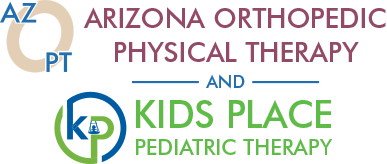Why Sensory Regulation is Important for Language Development in Pediatric Therapy
The Role of Sensory Regulation in Pediatric Therapy
Sensory regulation is commonly a goal in occupational therapy, but it is also an important concept in speech-language therapy. Occupational therapy assists in the participation and function of “occupations” and daily activities. A child’s job is to play. Play is how a child gains important skills for developing empathy, cognition, and language. Occupational therapy also helps children with sensory processing, which includes providing the tools and strategies for a child to become/stay regulated.
If sensory processing and being able to keep a child regulated is frequently a goal of occupational therapy, then why is this so important for speech-language therapy?
The purpose of speech-language therapy at Kids Place is to provide the child with the tools and resources needed for higher-level language and cognitive skills; however, to get to this level, there are several foundational skills that the child needs to develop first. The most fundamental of these skills is regulation. Once the child is regulated, then parents and clinicians can proceed with working towards joint attention and engagement (i.e., attending to songs or play activities), basic language skills (i.e., making requests to get basic wants/needs met), and then achieve higher level language and cognitive skills (i.e., knowing how to work through a problem to arrive at a solution).
Steps to Language Development: The Sensory SLP’s Staircase
Jessie Ginsburg, known as the Sensory SLP, describes a child’s language development as a staircase. Regulation is the bottom step, followed by engagement, then basic language skills, and the top step is higher-level language and cognitive skills. Ginsburg describes that when a child is dysregulated, it is “as if the bottom step of the staircase is missing, making it difficult for the child to access the staircase.” In other words, if a child feels lethargic, overwhelmed, angry, etc., it can be very difficult for them to engage with us in activities. When we, as parents and professionals, focus on ensuring the child is regulated or provided with the tools and strategies necessary to help bring that child to their balanced state, we see an increase in communication.
How Adults and Children Use Regulation to Perform at Their Best
As adults, we have become proficient in knowing what we need to help us feel regulated so that we are at optimal performance. If we have low arousal, we drink a cup of coffee. If we feel overwhelmed with a personal issue, we might go for a walk. When we feel out of balance, we have already learned different coping mechanisms to help bring us back to being regulated so we can optimally perform our tasks. If we are too tired or overly worried about a situation, we are not 100% focused or giving 100% of our best work to other tasks. This is the same for children.
If they are dysregulated and feel out of control with their emotions, they will struggle to feel engaged in the current moment. Early childhood development specialists stress the importance of engagement as this is how children learn. They watch and see what adults/peers are doing and learn from them. They engage with toys to learn how to problem-solve or sequence events in pretend play routines. Engagement is then the gateway to basic language because adults can then put language to what the child is doing while the child is calm and focused on an activity. Through these play routines, they learn higher-level language skills and acquire more complex cognitive skills, such as role-playing during pretend play to solve a problem and understanding the perspectives of different partners.
Sensory Strategies in Speech-Language Therapy
While speech-language pathologists may not write goals about becoming/remaining regulated, know that your child’s speech-language pathologist may be implementing strategies that assist with regulation. These activities might include having your child pull or push a bucket with heavy items, swing while completing an activity, or listen to music/nursery rhymes. Once a child is regulated, your child’s SLP can focus on the ultimate goal: communication.
Ready to Learn More?
If you believe your child may benefit from pediatric speech-language therapy or sensory regulation support, contact Kids Place today to schedule an evaluation. Our team of skilled pediatric therapists in Arizona is ready to help your child thrive through customized therapy plans. Visit us at AZOPT.net or call to get started!
For more information, visit:







